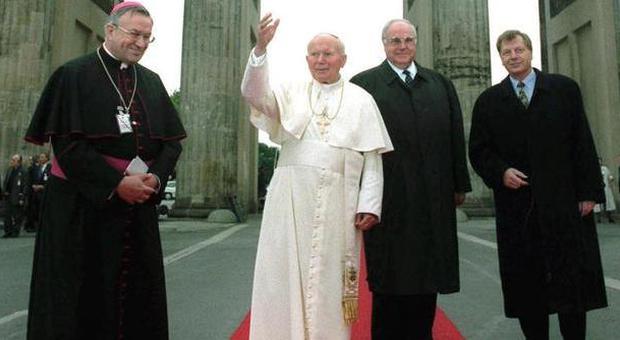The election of cardinal Wojtyla as Pope on 16th October 1978 was for many in the world, myself included, a great surprise, in fact a sensational event. With their choice the cardinals gave an important sign, also political, because for the first time they chose a man of the church coming from what was communist Poland, which had been in the limelight for many years in its battle against the atheistic and totalitarian ideology.
That his election was a decisive signal for world politics became ever more clear, year by year, during his pontificate. Right from the beginning John Paul II took up a very clear position on all questions about the rights of mankind and he showed himself an intrepid fighter for liberty. His attitude was certainly formed through his personal experience, first in the Forties during the Nazi regime, and then during the communist period in Poland.
I recall many wonderful and important talks with John Paul II, who I knew when he was cardinal of Cracow: in June 1977 at Magonza when he came to visit Cardinal Hermann Volk as his guest. At that time he already impressed me with his great vivacity and openness and likewise his great knowledge of the spiritual life of Germany, its philosophy and history.
To this great person, who looked far ahead also in the political sense, I was united by many things, as well as by our convictions regarding Europe. We held the same opinion on the essential significance of Europe for the future of our countries and our continent, for peace and for freedom. And with his continual reference to the Cross and Christian traditions in Europe, he underlined yet again that it is above all a community of values and culture.
Pope John Paul II’s contribution to the fall of communism is unforgettable. He played a decisive part in making the fall of the Berlin Wall possible and the pacific overcoming of the division in Germany and in Europe in 1989-1990. We Germans also remember with gratitude his visits in 1980, 1987 and, after the reunification of Germany, in 1996. I remember as if it were yesterday the evening of 23rd June 1996. On the east side of the Brandenburg Gate a manifestation was taking place for the Pope’s visit. Moving towards it, the Pope and I walked together from West to East, through the Brandenburg Gate. In that moment, he took my hand and said, “Chancellor, this is a great moment in my life. I, the Pope who comes from Poland, am with you, the German Chancellor at the Brandenburg Gate and the Gate is open, the wall has fallen, Berlin and Germany are no longer divided and Poland is free”.
We Germans and Europeans, as well as many people in the world, all have a reason to thank this extraordinary man. He was a Pontiff in the true sense of the word: he was a builder of bridges. He was the greatest Pope for a long time. The sanctification of John Paul II also has a great symbolic value in an age in which the world, and particularly Europe, finds itself in a difficult situation. In the unrest of these days, it is significant that together with him another important Pope is being proclaimed saint, the Italian John XXIII; in his phrase, which I happily allude to: “John, don’t take yourself too seriously”, is an important message. Who takes a position full of responsibility and power must never see himself as the measure of everything.
Let us hope that the canonisation of these two Popes is a sign for all of us and a guide for those who carry political responsibility. To this belongs the finalisation and the deepening of the common responsibility in Europe for peace and freedom. And it is also right that we should not forget that Russia is part of our Europe as well, not only because of its geographic position but also through its history and its culture.
Translation by Antoinette Canini
© All rights reserved
© RIPRODUZIONE RISERVATA
